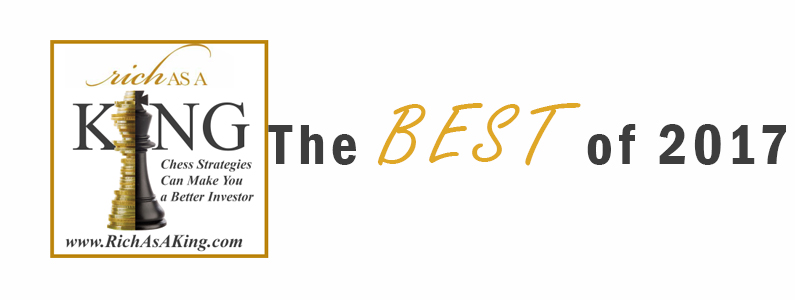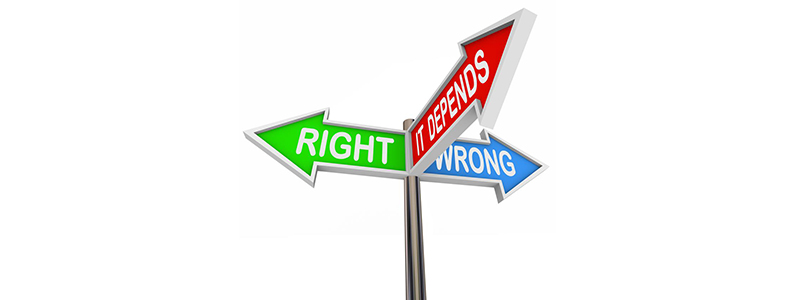
by Doug Goldstein CFP® | Dec 19, 2017 | Other |
Improve your financial situation in the New Year by conducting a project postmortem. Reviewing and analyzing a chess game helps you prepare for the next time you play. In general, performing a postmortem on anything can help boost results the next time around. Susan and I just held a postmortem on 2017 and analyzed our most popular Rich As A King posts from the past year. We hope to give you more on the topics that interest you in 2018. Meanwhile, here are links to the top posts for you to review: Blogposts How Basic Chess Tactics Can Help You Make More Money – Find out how chess tactics can be applied both to investing and personal finance, and also to life in general. Does a Budget Tracker Really Help Your Bottom Line? – Learn how a budget tracker really helps you save. Why It’s Important to Know Your Risk Level before You Invest – Just like in chess you don’t want to risk your quality pieces, learn how to mitigate the risk in your investment portfolio. Podcasts How to Use Multiple Attack Strategy to Improve Investment Performance – Use a “multiple attack strategy” to improve your investment performance AND prowess on the chessboard. Which Is the Best Country to Invest in for Global Diversification? – Global diversification is an important part of investing. Find out about allocating your assets safely and how to decide where to invest. Two Ways Baby Boomers Can Have a Successful Retirement – Get a strategy for approaching retirement. What topics interest you? Our community boosted these pieces into top positions on our blog. ... Click for more

by Doug Goldstein CFP® | Dec 5, 2017 | Decision Making, Financial Plan |
Here’s an important financial tactic that is often overlooked, but can help boost both your bottom line and your performance on the chessboard: Use your head! Don’t run on automatic pilot. Be aware of what you’re doing and put clear thought and consideration into every step you take. Don’t just play with your hands When Georges Renaud and Victor Kahn authored The Art of Checkmate, they wrote: “Chess is played with the mind and not with the hands!” If you want to win a game of chess, don’t just move your pieces around the board. Think your moves through very carefully. Where are your opponent’s pieces in relation to yours? Would moving your bishop over there put your king at risk? The same principle of thinking and not just acting also applies to investing. Before making an investment decision, ask yourself (and your financial advisor) the following: What are the risks involved? How much of a loss can I sustain if things don’t work out? Does this particular decision conform to my financial plan and current goals? Review your financial situation Review your financial plan and see if you are meeting your goals and financial objectives. If not, you may need to make changes to your investments after all. Even if you want to leave your portfolio at its current status quo, this is also an active decision that requires logical thought. “Chess is played with the mind, not the hands” can be a metaphor for thinking and analyzing all your... Click for more

by Doug Goldstein CFP® | Nov 21, 2017 | Decision Making |
The key to understanding investments is to avoid unrealistic expectations. One of the biggest mistakes investors make is expecting too much from an investment. But why do people have unrealistic expectations of their investments? There’s no such thing as getting rich quick For some people, their ideal is to get rich quickly, without having to work too hard. So when they see a potential investment promising a very high yield, they get very excited. But in their haste to realize their dream of instant wealth, they forget the famous maxim, “If it sounds too good to be true, then it probably is.” In fact, investments with very high yields are either extremely high risk or shady. In their rush to fulfill their unrealistic expectations, these investors ignore their better judgment and have an incomplete understanding of the situation. This can be compared to when you are playing chess and you suddenly see that the path towards your opponent’s king is wide open in front of you. You may not stop to think that things may not be as they seem. It is much easier to just look at the squares in front of you, instead of at the whole board. You move your queen into position, ready for check. Suddenly, your opponent’s piece comes out from a direction that you didn’t expect and takes your queen! You are now left wide open to an attack, and the game is not going in the way you expected. Why weren’t you more careful? Your unrealistic expectation of an easy win impaired your ability to think things through clearly. Consider the risks... Click for more

by Doug Goldstein CFP® | Nov 7, 2017 | Chess, Decision Making |
Is it always an act of kindness to give your adult children financial support? Many parents who give their grown children financial assistance have good intentions. While their generosity appears to be a gift on the surface, these adult children may pay a heavy price for the free money. Why is supporting your adult children so damaging? When overprotecting your king ruins your game Let’s take a look at what happens if a chess player is too protective of his most vulnerable piece – the king: As the most important piece on the board, the king needs protection. But sometimes building a strong fortification around the king makes it more susceptible to a deadly attack since it cannot move itself out of harm’s way. Too much protection of a valuable piece can actually stifle its movements. Similarly, as a “chess dad,” who has watched winning and losing tournaments, I can tell you how difficult it is not to help my kids. I know that when the pressure is on, it’s important to let them play their own game. By giving them space to move themselves, they learn how to become self-sufficient. This teaches an important financial lesson: Sometimes overprotecting a valuable asset leads to its ultimate downfall. This may happen if you give too much financial support to your children. Consider those folks who hover over every aspect of their children’s lives, buying their sons and daughters anything they want. Their tuition and extracurricular activities, no matter how expensive, get delivered to them, along with credit cards to use without needing to pay the bills. Finally after grad school,... Click for more

by Doug Goldstein CFP® | Oct 24, 2017 | Chess Strategies, Strategic Thinking |
If you want to boost your financial returns, try applying one of my favorite chess tactics – the chess fork – to managing your money. What is a chess fork, and how does it work? When a chess player forks his opponent, he moves his piece to a strategic square, threatening two of his opponent’s pieces at the same time. Since his opponent cannot save both threatened pieces simultaneously, the chess fork gives its player a distinct advantage. A chess fork can help you achieve two goals through a single action, as illustrated by the expression: “Kill two birds with one stone.” In finance, this can be compared to enhancing one of your assets so that it fulfills two or more of your financial goals. In this way, you receive multiple benefits from a single investment. Enhance your retirement funds One great way to make your assets work double-time for you is to put money into an IRA or a 401(k). These retirement plans are similar to the concept of a using a fork in chess, since a single action reaps multiple benefits: You get a current tax deduction – the money you put into the retirement plan lowers the amount of tax you pay today. Your money grows tax deferred – if you put money into an IRA or 401(k), you are only taxed on the profits when you withdraw any funds. Then, you are only taxed on the amount that you have withdrawn, not what remains inside the account. By leaving your money to grow untaxed, you will gain more. If you have a 401(k) plan from... Click for more









